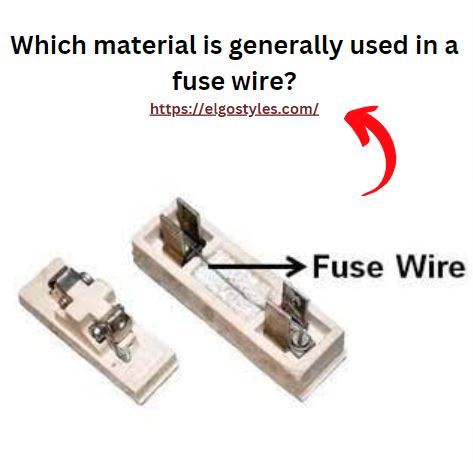Answer:
The material generally used in a fuse wire is an alloy of tin and lead.

Reasoning:
- Low Melting Point: Tin-lead alloy has a low melting point, ensuring it melts easily under excessive current.
- Good Conductivity: The alloy maintains good electrical conductivity, ensuring efficient current flow.
- Safety: It’s chosen for its ability to melt and break the circuit during overcurrent situations, preventing damage to electrical appliances or circuits.
- Cost-effectiveness: Tin-lead alloy is relatively inexpensive compared to other materials, making it a practical choice for mass production of fuse wires.
- Availability: Tin and lead are readily available materials, ensuring easy sourcing for fuse wire production.
FAQs:
What is a fuse wire?
A fuse wire is a thin conductor designed to melt and break an electrical circuit under excessive current flow.
Why is tin-lead alloy preferred for fuse wires?
Tin-lead alloy has a low melting point, good conductivity, and is cost-effective.
Can other materials be used for fuse wires?
Yes, materials like copper, aluminum, and silver can be used, but they are less common due to cost or performance reasons.
How does a fuse wire protect electrical circuits?
By melting when excessive current flows through it, the fuse wire breaks the circuit, preventing damage to appliances or wiring.
What determines the thickness of a fuse wire?
The thickness is determined by the maximum current the circuit can handle without damage.
Are fuse wires reusable?
No, once a fuse wire melts, it needs to be replaced.
Can fuse wires be replaced with other components?
Fuse wires can be replaced with fuses, circuit breakers, or other protective devices depending on the application.
Is there a standard size for fuse wires?
Yes, fuse wires come in various standard thicknesses to match different current ratings.
How do you know if a fuse wire has blown?
A blown fuse wire will have a visible break or gap in its length.
Are there safety regulations regarding fuse wire materials?
Yes, safety standards often dictate the materials and specifications for fuse wires to ensure reliability and safety.
 Electrical Engineering World Wiring a Brighter Tomorrow!
Electrical Engineering World Wiring a Brighter Tomorrow!